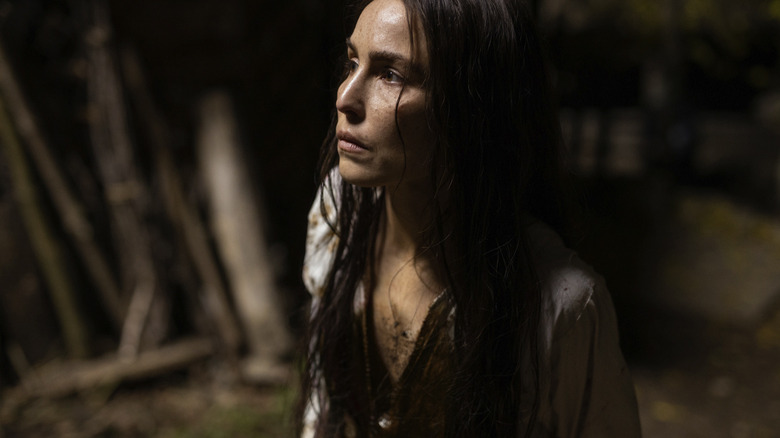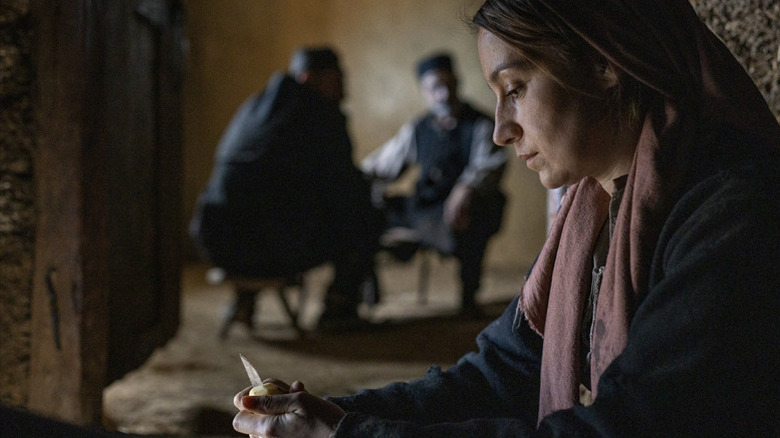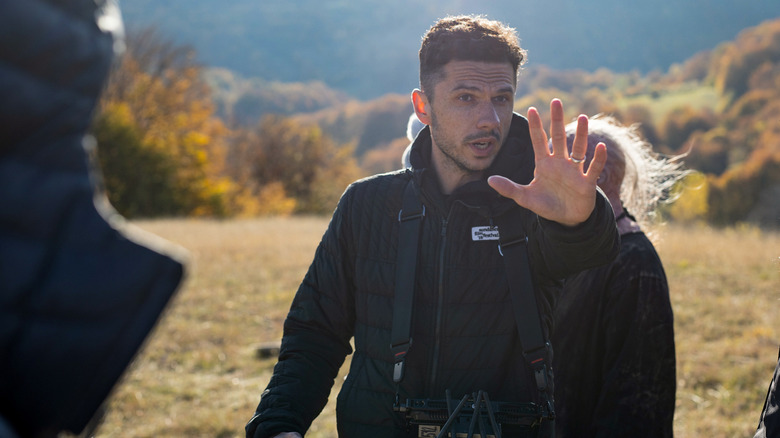You Won't Be Alone Director Goran Stolevski And Actor Anamaria Marinca Talk Genre And Connection [Interview]
Horror is often unfairly dismissed as being a less "serious" film genre, but there are more than a few scary movies that prove there's plenty of beauty, hope, and thought-provoking themes to be found amid the gore and ghouls. Such is the case with "You Won't Be Alone," which is currently playing in select theaters. Set in 1800s Macedonia, the movie tells the story of a young girl who is kidnapped and turned into a witch, and follows the witch as she takes the shape of her victims in an effort to satiate her curiosity about what it means to be human.
But "You Won't Be Alone" is one of those movies that you really need to watch in order to fully grasp and appreciate the plot; a simple synopsis just doesn't do it justice. We were able to sit down with director/screenwriter Goran Stolevski and actress Anamaria Marinca to talk about the film's themes, the makeup, connecting with audiences, and more.
'I don't think anyone is actually only bad or only good'
I'm very much into special effects and makeup. What was the makeup transformation process like for you?
Marinca: It was spectacular for me, as well. It's not my first time with prosthetics, but I think it's the most spectacular change I've ever experienced in a character. It was a long process. Everyday when I played Maria the old maid, I think it took us four or five hours to make it look the way you saw it on screen. It was very exciting because I realized that everybody was staring, the change was so big for me and the others! It stayed like this for almost two months, everyday! [...] It was quite exciting to get there and to see these amazing makeup artists at work, doing their best work. I mean, it's incredible what they can do.
They did an amazing job. Do you ultimately see Maria as more of a sympathetic character. or purely a villain?
Marinca: Well, you can't see your own characters as villains. I think, for me, I have to fall in love with a character to be able to play [them], you know? And I understood her. I don't think anyone is actually only bad or only good, and I understood her trajectory. I understood her history, and the hurt, and the loneliness, and the envy she had on other human beings and their innocent souls. She was so hurt, she couldn't experience love or motherhood or any other normal human emotion, I think.
Yeah, that's the takeaway that I got, too. I didn't like her actions, but it's hard to hate her as a character when you see what she's gone through and how she ended up the way that she is.
Marinca: Yeah, I agree. I think every actor fights for their character, you know? I was trying in the flashback fragment to give her justice.
Well, I think you did an amazing job with that. I thought it was such a good movie and everyone's performances were amazing.
Marinca: Yeah, I'm very lucky to be in such wonderful company. I think all the actors are amazing in it.
What did you enjoy most about the filming process?
Marinca: I think I enjoyed filming with my friend, Goran — he's a wonderful writer and director — because we had been planning for a long time, for years, to do something together, and it finally happened. And meeting new friends on set. I think everyone that was on set became a friend. Everyone was almost the same age, and we all loved the script, and in the middle of the pandemic we had the opportunity to be together and to have that long-lost human contact. I think for all of us, it was an amazing time spent together.
Do you think the fact that it was filmed during the pandemic — and the film deals with themes of loneliness — do you think that helped everyone get into their role? Did it help you get into your role?
Marinca: Certainly, on a subconscious level, I'm sure it did. We were planning to do this film for a while, so I had read the script before, and we were supposed to start filming, I think, in the spring. But I guess there was another layer added during the pandemic, for everything. For every part I've done since, it will be in me, and I think I will cherish, much more, my connections and my friendships and my family and the time spent with them.
That's a beautiful answer. So my next question is if you could choose three words to describe the film as far as your personal takeaway or the overarching themes, what would those words be?
Marinca: They would be "mother," "love," and, "blood." [laughing]
That sounds like a good title for another movie!
Marinca: I don't know! I should have thought about this before; it's a good question! It's very difficult to answer. If someone else asked the same thing, I would forget what I said.
I feel like some of those are the same takeaways that I got. I cried watching the movie because it was just so emotionally intense. I think whenever something deals with themes of loneliness and what it means to be human and humanity, that tends to pull on the heartstrings.
Marinca: Yeah, I think because the film is a genre movie, it's an amazing tool and it's an amazing vehicle for these perennial human feelings, and it's not limited to that spirit of time or that village. I think someone from a very different part of the world can recognize those feelings and can vibrate to the story. And that's amazing! That's the quality of good art, I think, to transgress all kinds of barriers, isn't it?
Yeah, definitely. Is there any question in particular that you're hoping to be asked that no one has asked yet?
Marinca: No, I'm usually nervous doing interviews! I feel I need to prepare before. It's strange because it comes so easy doing what I do [acting], you know? That's what I chose to do in life, but when it comes to speak about it, you suddenly doubt everything you say because this sudden, I don't know, need to define things sometimes limits what you're trying to say or what the film is trying to say. So I'm always very worried about describing what I did, or what the film is about. So I'm not sure I can help you with yet another question [laughing].
That's totally fine! Did you have a favorite scene in particular?
Marinca: It's hard to choose, because I really enjoyed all of them. I think I was very invested in the flashback fragment, in my background story of being in my village and becoming Old Maid Maria. I think that, for me, was the journey that was very emotional — as you probably can see. But I loved being the Old Maid Maria, it's the completely other tonality, and because we alternated the two faces, it gave me time to breathe as well. Because I think being Old Maid Maria with all the makeup and costume would become difficult at some point after many days, whereas we had these changes that helped me a lot.
'Imagine if a fairy tale or folk tale was based on a true story'
Did you have an intended emotional impact or takeaway in mind for viewers?
Stolevski: It's kind of a very instinctive process for me, writing, creating a movie. I don't really set out with a particular aim or phrase of like, "This is what I want to do." You kind of follow where the movie is taking you. I think now that it's finished, I feel like where it hits hard for me is just a sense of like, there's these two people, Nevena and Maria, both of them are sort of like in this very repressive setting, essentially. As beautiful as it is visually, it's very repressive emotionally, and they both want more out of life, and I relate to that hunger; I just want to live a full life.
Both of them try everything they can within their setting, and then it kind of keeps exploding in their face, and they have to suffer over and over and over again, and it's not really their fault, and they're doing everything that they can. Then one of them retains the hope associated with the beauty in life and wanting to connect with people, and then one very much doesn't. I understand both of those feelings, and I find it devastating that a person can lose something. I also find it devastating when someone can hold onto something, even when they're forced to put up with a lot of suffering. To me, it's that contrast of what is it that makes a person lose hope in other human beings, and what is it that makes someone hold onto that hope? That's what I find moving, and I've heard that's what it is for people, but really, the movie belongs to other people now. It's not about what I intended or meant; it's really what they take away from it.
OK, cool! That's a really good answer.
Stolevski: [laughing] Cool! Let's aim for another one!
Was there a particular inciting incident or source of inspiration for the movie, or was it just something that had been with you for a while that you wanted to write?
Stolevski: I tend to normally write relationship drama, and I thought I should try writing something more genre-based, but still do it with my own personality and my sensibility — kind of take a genre premise, but pretty much treat it like a relationship drama. Follow the characters and their feelings rather than just plot conventions and genre conventions, and just from that I thought I'd write a horror movie. I do mainly write from women's perspectives, so I just thought witches were the natural development from that — but in treating witches as you would any human being, and it just kind of came from there. You know, realizing that there's a pattern in both Eastern Europe and Western Europe, and I think a lot of inquisitions around the world, where if a woman was accused of witchcraft, she was accused of taking the shape of another human being or an animal. So I thought, "Well, if you could do that, what an interesting way to look at life." Then combining that with the voiceover that runs in the film, like phrases of that kind of came to me in and of themselves, and then just connecting it all into a cohesive set of feelings, essentially. Then building the story around that.
That makes sense! I'm a really big fan of folklore and fairy tales in general, so I appreciated that was a theme in the movie.
Stolevski: Yeah, well, that's the thing! I thought that I was gonna write a horror movie, and then realized at some point that this is actually more like a fairy tale, really, or a folk tale. I was talking to people who were coming to set in terms of trying to describe the visual style or sensibility of the movie, [and] I would say, "Imagine if a fairy tale or folk tale was based on a true story, and we're making like a documentary-style [movie] about that true story," rather than setting out to do a horror movie, specifically.
If you could describe the film in just three words, what would those words be?
Stolevski: Oh, god. I'm so bad at this. I told you I can never just keep the answers short [laughing]. Three words ... connection, humans, love.
I asked Anamaria the same question, and "love" was also one of her answers!
Stolevski: Of course, because we communicate telepathically [laughing]! I miss her so much.
Much appreciated! As far as the casting the role of Nevena, was there a unifying feature that you were looking for when it came to casting the different actors and actresses that portrayed her?
Stolevski: I think it was more like the style of acting rather than what they were like physically. It was more about rawness and the raw approach to acting. I like fearless actors — actors who will do anything to kind of fit into a role. So yeah, rawness and fearlessness. That was kind of the pattern I was looking for, and how we ended up with the cast. Coincidentally in the end, we ended up with people who had a lot of parallels in terms of life — some of them I can't really talk about because it's confidential, but yeah. It was interesting: That was a quality I was looking for, and then the types of personalities I was working with ended up being similar in so many ways, even though they were such different people in other ways. It was fascinating.
I found the movie very relatable, which makes sense because it touches on humanity and what it means to be a human, so if you're a human you would find that relatable. But for me, personally, I don't know how candid people are supposed to get in interviews, but I was diagnosed in my early 20s as being on the autism spectrum, so I experience life differently or interpret social interaction differently than other people. So I found myself relating a lot to the main character because her experiences kind of mirrored my own in a way, because sometimes it seems like some people know how to act in social situations and other people observe more, and I just thought that was really cool.
Stolevski: That's not a coincidence! I'm a little bit the same [laughing]. I mean, I haven't been diagnosed officially, but I've had the same experience my whole life. I mean, I grew up in Macedonia and then I moved to Australia when I was 12, and it is that thing. I mean, you watch people, and the way they interact comes from instinct in a way that I don't understand, and I never have, and I'm resigned now that I never will. It is literally something that fascinates me so much, and also what I find in reading up about this issue, because it's been very important to me for many years, [is] with boys, they tend to generally just not want to connect with other people; whereas with girls, even if you don't understand what it is that makes people connect, you still want to. That's what I relate to, because I feel like a lot of my brain is very female — most of it, really — and I felt like that's what I also wanted to capture, instinctively. Again, I wasn't really thinking about it, and then once it was in the movie I'm like, "Oh yeah, so this is how I engage with life." My whole life, that thing of like, there's people, and I'm on the outside and I figure out how they're kind of engaging with each other and trying to figure out the patterns, and where I fit in and how I can do it. And it becomes imitated at the start until you start to understand the feelings, and you never quite end up fitting in. That was literally the process that came to how this character was formed.
That's awesome. I know it's cliche to say, but it was very much a hauntingly beautiful movie because it was so moving. It made me cry, but in a good way, because I get emotionally impacted....
Stolevski: No one's actually brought that up, and it was literally one of the most important things to me about the movie, so it's amazing that it came across to someone. We've never met and you picked up on that, so that's really moving for me. So thank you.
You're welcome! I was texting my boyfriend while I was watching it, and I was like, "This movie is like ... I feel like someone is watching my life!"
Stolevski: That's so great! I feel like you're gonna make me cry. Thank you so much!
You're welcome. I watch a lot of movies because of my job, but I'm not even saying because I'm talking to you, but it's one of the best movies I've seen so far this year.
Stolevski: Thank you so much. Thanks so much, Deshawn.
Thank you as well! I think that's all that I have, so thank you for taking the time to speak with me.
Stolevski: It was such a pleasure! Let's do this again with the next movie!
Yeah, seriously! Make more!
Stolevski: Yeah, I'm just finishing one now, so if you want, we can talk again.
Are you allowed to say what the title is or what it's about or anything?
Stolevski: Oh yeah, it's called "Of An Age." It's very different. It's a love story between two boys in suburban Melbourne in Australia. That's another part of my life entirely. It's very different from this one, but it's also about outsiders, actually within a world and how they engage. It'll be interesting what people make of it, because in so many ways it's completely the opposite to the movie I just made.
"You Won't Be Alone" is currently playing in select theaters.


